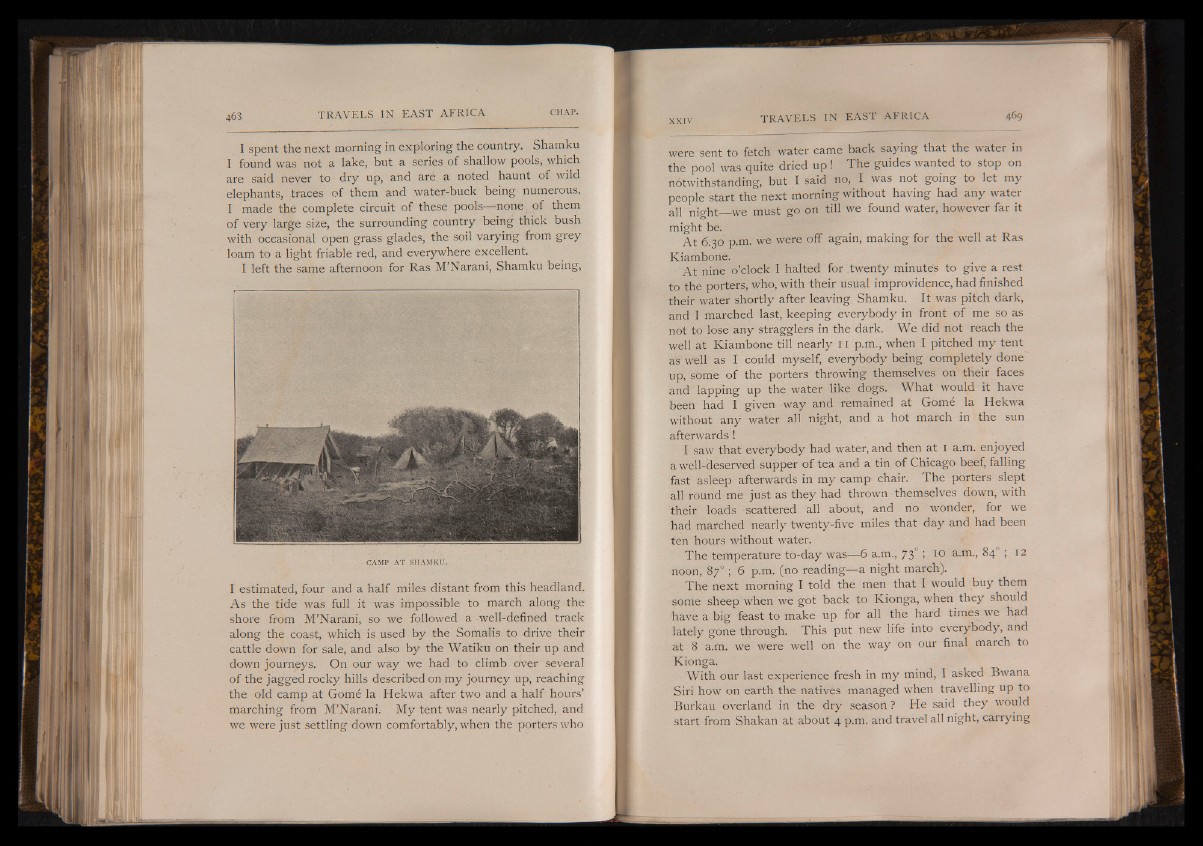
I spent the next morning in exploring the country. Shamku
I found was not a lake, but a series of shallow pools, which
are Said never to dry up, and are a noted haunt of wild
elephants, traces of them and water-buck being numerous,
I made the complete circuit of these pools-^—none of them
of very large size, the surrounding country being thick bush
with occasional open grass glades, the soil varying from grey
loam to a light friable red, and everywhere excellent,
I left the same afternoon for Ras M’Narani, Shamku being,
C AM P A T SH AM KU .
I estimated, four and a half miles distant from this headland.
As the tide was full it was impossible to march along the
shore from M’Narani, so we followed a well-defined track
along the coast, which is used by the Somalis to drive their
cattle down for sale, and also by the Watiku on their up and
down journeys. On our way we had to climb over several
of the jagged rocky hills described on my journey up, reaching
the old camp at Gome la Hekwa after two and a half hours’
marching from M’Narani. My tent was nearly pitched, and
we were just settling down comfortably, when the porters who
were sent to fetch water came back saying that the water in
the pool was quite dried up ! The guides wanted to stop on
notwithstanding, but I said no, I was not going to let my
people start the next morning without having had any water
all night we must go on till we found water, however far it
might be.
At 6.30 p.m. we were off again, making for the well at Ras
Kiambone.
At nine o’clock I halted for twenty minutes to give a rest
to the porters, who, with their usual improvidence, had finished
their water shortly after leaving Shamku. It was pitch dark,
and I marched last, keeping everybody in front of me so as
not to lose any stragglers in the dark. We did not reach the
well at Kiambone till nearly 11 p.m., when I pitched my tent
as well as I could myself, everybody being completely done
up, some of the porters throwing themselves on their faces
and lapping up the water like dogs. What would it have
been had I given way and remained at Gome la Hekwa
without any water all night, and a hot march in the sun
afterwards !
I saw that everybody had water, and then at 1 a.m. enjoyed
a well-deserved supper of tea and a tin of Chicago beef, falling
fast asleep afterwards in my camp chair. The porters slept
all round me just as they had thrown themselves down, with
their loads scattered all about, and no wonder, for we
had marched nearly twenty-five miles that day and had been
ten hours without water.
The temperature to-day was— 6 a.m., 73° > 10 a-m-) 84 1 12
noon, 87°; 6 p.m. (no reading— a night march).
The next morning I told the men that I would buy them
some sheep when we got back to Kionga, when they should
have a big feast to make up for all the hard times we had
lately gone through. This put new life into everybody, and
at 8 a.m. we were well on the way on our final march to
Kionga.
With our last experience fresh in my mind, I asked Bwana
Siri how on earth the natives managed when travelling up to
Burkau overland in the dry season ? He said they would
start from Shakan at about 4 p.m. and travel all night, carrying